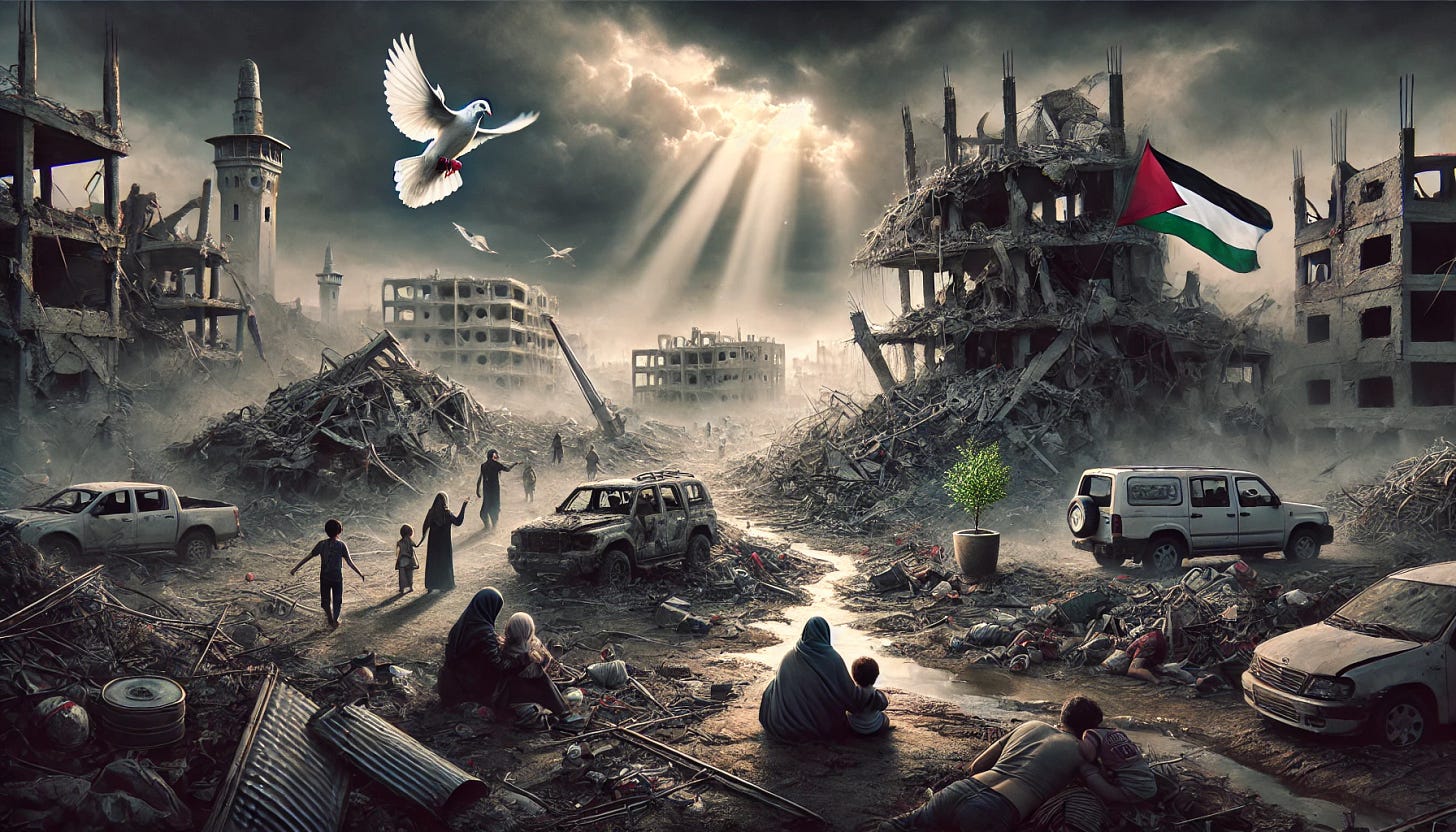WHO LIVED TO SEE THE CEASEFIRE?
I just read the breaking news: a ceasefire has been declared! Many are rejoicing. Some say people have taken to the streets to celebrate. Donald Trump has received a gift for his inauguration, and he will appear crowned with a laurel wreath, befitting a peacemaker (never mind that he is surrounded by hawks).
This is a moment of mixed emotions and conflicting thoughts. For someone who has spent the last year and a half going to bed and waking up with the guilt of having a warm home, food, and basic safety while children die from hunger, cold, and bombs—this should be incredible news. Yet, as I read through the terms of the ceasefire, trying to remain objective and rational, tears inevitably come. The words of Croatian poet Grigor Vitez resonate deeply:
“The news traveled faster than a bird, swifter than the wind, quicker than lightning. It cooed with joy through the ether. But it arrived too late. For those who have fallen, it is always too late… The message should have been sent long, long before—before the first lives were lost.”
Centuries earlier, Plato also knew that only the dead have seen the end of war.
The world—those who understand that genocide does not end with a ceasefire—must now focus on the fate of the survivors: the old, the young, the children, and the displaced. And not just in Gaza, but also in the West Bank.
Here are my thoughts on the terms agreed upon by both sides:
1. The return of displaced Palestinians to their homes in northern and southern Gaza, with freedom of movement across all areas of Gaza.
But where will they return? To homes reduced to rubble? To ruins under which the bodies of their loved ones still lie? Will there be machinery, technical assistance, and efforts to rebuild these homes before the harsh winter arrives? Who will pay for it? And what about those who have no one left to return to, who are utterly alone? This genocide has created a new category of people entirely alone in the world—mostly children. These are not ordinary orphans; their entire families have been erased. Who will care for them?
2. Full withdrawal of Israeli military forces from all areas of Gaza, including key points like Netzarim and Philadelphia.
Let’s see how quickly this promise is fulfilled, as the most recent reports still spoke of widespread killing. The Israelis seemed to be in a bloodthirsty frenzy, as if driven by the need for more carnage before they are forced to face themselves and the full weight of their actions.
3. Hamas remains in government.
What does it mean to govern a graveyard? Whether it’s Hamas or someone else might matter politically or symbolically (to avoid being seen as the defeated side). But what Palestinians truly need are conditions for survival and recovery from collective and individual trauma. Can anyone even think of political life after a Nakba like this? Gaza has been returned to the Stone Age, as Netanyahu promised. And by the way, if Hamas stays in power, does that mean Netanyahu remains at the helm of Israel—a state that has lost every shred of legitimacy and respect? Let’s not forget: Israel is already under investigation for genocide. No ceasefire agreement will erase that fact.
4. The opening of the Rafah border crossing for humanitarian aid and trade, with 600 aid trucks entering daily to address urgent needs.
This clause reeks of cynicism. Imagine: after 1.5 years of terror and the deliberate extermination of an entire population, they are now haggling over the number of aid trucks allowed? And only for “urgent needs”? Gaza requires immediate, unrestricted humanitarian aid—by land, sea, and air. This is not a matter for negotiation.
5. The release of prisoners: 250 Palestinians serving life sentences, 400 with high sentences, 1,000 detained from Gaza after October 7, and all detainees from the Shalit Deal, including women and children.
This is one of the few rays of hope—a prisoner exchange. Yet, something tells me the treatment of hostages by Hamas was far more humane (even under impossible conditions, as they themselves starved and risked their lives) than the treatment endured by Palestinian prisoners. We now have detailed evidence of sexual abuse against children as young as ten, of terror akin to Abu Ghraib, of people who simply “disappeared.” Will that brave doctor ever return alive? Who will ensure the well-being of these people? Does it not break your heart to read “including women and children”?
A Time to Reflect
There’s so much here to process. Right now, I can only cry for those who didn’t live to hear the news that some are calling good. There is a faint sense of relief that wants to shout for joy—but it remains knotted in skepticism, fear, and disbelief that those who commit atrocities can suddenly become humane.
For the dead, it is too late. For the survivors, the real struggle is only beginning.




